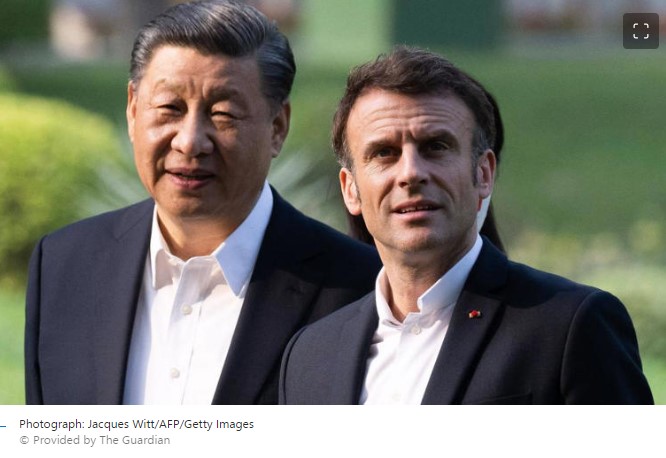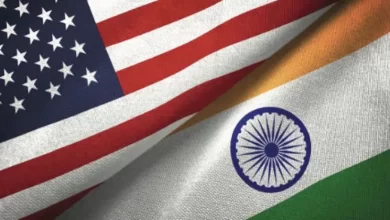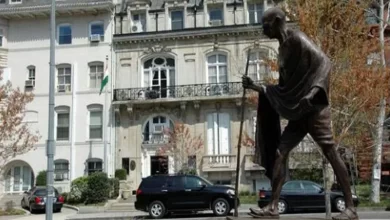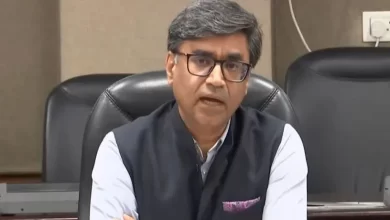Macron sparks anger by saying Europe should not be ‘vassal’ in US-China clash

Emmanuel Macron has flown into a storm of criticism after he said Europe should not become a “vassal” and must avoid being drawn into any conflict between the US and China over Taiwan.
The French president made the remarks in an interview on his plane after a three-day state visit to China, where he received a red carpet welcome by President Xi Jinping – a show of pageantry that alarmed some European China watchers.
Speaking to reporters from Les Echos and Politico, Macron said Europe should be a third power in the world order, along with the US and China. While the comments reaffirmed Macron’s long-term goal of “strategic autonomy” for Europe, namely avoiding military and economic dependencies, his remarks on Taiwan stoked anger and alarm on both sides of the Atlantic.
According to Les Echos, Macron said: “Do we [Europeans] have an interest in speeding up on the subject of Taiwan? No. The worst of things would be to think that we Europeans must be followers on this subject and adapt ourselves to an American rhythm and a Chinese overreaction.”
He added it would be “a trap for Europe”, now it had developed more autonomy since the Covid pandemic, to get caught up in crises “that are not ours”. If there was an acceleration of conflict between the American and Chinese duopoly “we will not have the time, nor the means to finance our own strategic autonomy and we will become vassals, whereas we could become the third pole [in the world order] if we have a few years to develop this”.
Macron said the need for Europe’s “strategic autonomy” was now widely accepted and there had never been “such an acceleration of European power” as in recent years.
He also emphasised the risks to Europe of the US Inflation Reduction Act (IRA), a $369bn (£300bn) green subsidy plan, and overdependence on the dollar. However, he said Europe had reacted with great speed to come up with “our European IRA”, referring to plans to boost homegrown green tech and the production of critical raw materials.
And he suggested his talks with Xi had been useful in confronting “complacency on the part of China with regard to Russia”. The goal of the dialogue with China was to “consolidate common approaches” over the war in Ukraine, Macron said.
According to Politico, the Élysée presidential palace checked Macron’s quotes before publication as a condition of granting the interview and insisted on the removal of lines where Macron had spoken “even more frankly” about Taiwan and Europe’s strategic autonomy.
In a social media post linking to the Politico interview, the US Republican senator Marco Rubio said if Macron spoke for all of Europe, then the US should consider focusing its foreign policy on containing China and leave Europe to handle the war in Ukraine.
Rubio, who lost the Republican presidential nomination to Donald Trump in 2016, said he supported US aid for Ukraine but if Europe was going to pick sides over Taiwan a rethink was in order: “Maybe, we should basically say we are going to focus on Taiwan and the threats that China poses, and you guys handle Ukraine and Europe.” Seizing on the Politico disclaimer, Rubio said Macron had said “even worse” things before the Élysée edits.
In an editorial, the Wall Street Journal said the French president’s “unhelpful comments” would undermine US and Japanese deterrence against China in the western Pacific, while encouraging US politicians who wanted to reduce American commitments in Europe. “If President Biden is awake, he ought to call Mr Macron and ask if he’s trying to re-elect Donald Trump,” the paper wrote.
Norbert Röttgen, a German centre-right MP who is a member and former chair of the Bundestag’s foreign affairs committee, said Macron had turned his trip to China into “a PR coup for Xi and a foreign policy disaster” for Europe. “With his idea of sovereignty, which he defines in demarcation rather than partnership with the USA, he is increasingly isolating himself in Europe.”
Reinhard Butiköfer, an MEP who chairs the European parliament’s China delegation, described Macron’s China visit as a “complete disaster”. The German Green MEP, who has been sanctioned by Beijing over his stance on human rights in Xinjiang, also said Macron’s “pipe dream” of EU strategic autonomy and becoming a “third superpower” was “beyond the pale”. He added that the European Commission president, Ursula von der Leyen, had shown “a better alternative”.
Von der Leyen recently said the EU needed to reassess its relations with a Chinese government that had ramped up “policies of disinformation and economic and trade coercion”.
While Macron was praised in Brussels for inviting Von der Leyen to join him in Beijing, the reality of the visit only highlighted China’s attempts to divide and rule. While China rolled out the red carpet for Macron with a state banquet and military parade, Von der Leyen was given a chilly reception and excluded from the pageantry.
Supporters of Macron said the interview contained little that was new to either him or French foreign policy since Charles de Gaulle. Gérard Araud, a former French ambassador to Washington and the UN, said Macron had started an important debate at a time when “the temptation exists to consolidate into a ‘western bloc’ under American direction assured to be on the side of ‘good’”, adding: “it would be a mistake to give into this.”
The row recalls previous controversies such as when Macron declared in 2019 Nato was experiencing “brain death”, or when last year he infuriated central and eastern European allies by saying Russia would need security guarantees when the time came to negotiate a peace settlement with Ukraine.
Mujtaba Rahman, the head of Europe at the research firm Eurasia Group, said the timing of Macron’s latest comments was poor. “To make these remarks as Chinese military exercises encircled Taiwan – and just after his state visit to China – was a mistake. It will be interpreted as appeasement of Beijing and a green light to Chinese aggression.”
Rahman added that Macron’s interview was being seen as a parting gift to Xi – “another doomed attempt (after Putin) to sweet-talk an autocrat” – and suggested the French president may have been trying to boost his poll ratings in France by emulating De Gaulle. “More likely, it was just Macron being Macron, thinking ahead in an interesting way but not measuring the immediate political impact of his words,” Rahman said.







